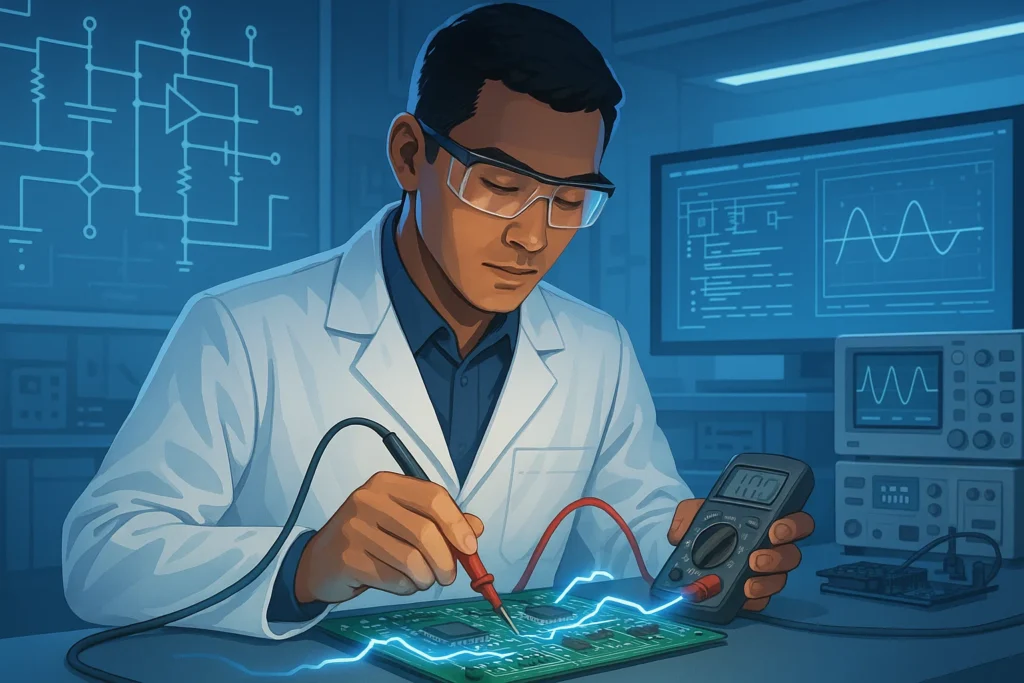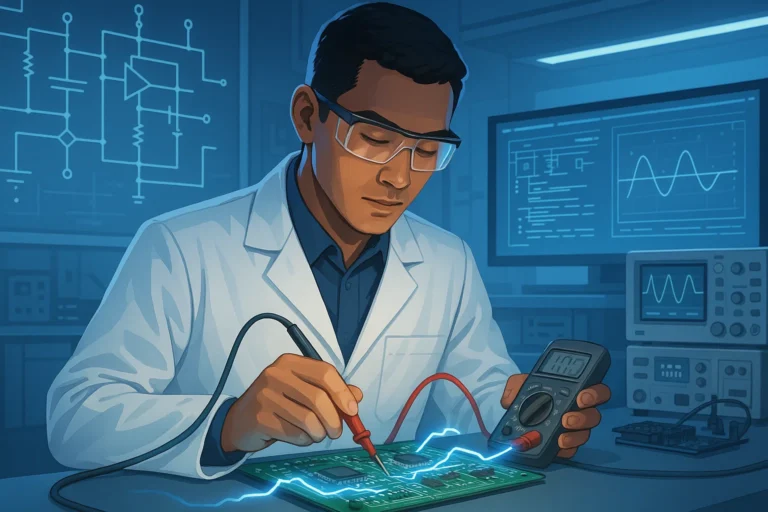
what do electrical engineers do
Meta Title:
What Do Electrical Engineers Do? Roles, Skills & Career Paths Explained
Meta Description:
Discover what electrical engineers really do—from designing power systems to shaping the future of tech. This expert guide breaks down roles, skills, tools, and more.
Introduction: So, What Do Electrical Engineers Actually Do?
Let’s be honest—when someone says they’re an electrical engineer, most people just nod politely, picturing them fixing wires or something. But the truth is, electrical engineering is one of the most diverse and essential fields in modern technology. what do electrical engineers do

Whether you’re a student considering this career path, an SEO newbie optimizing career pages, or just plain curious, this guide will walk you through what electrical engineers do, how they do it, and why their role is absolutely electrifying (yes, pun intended). what do electrical engineers do
H2: What Is Electrical Engineering?
Electrical engineering is the branch of engineering that deals with electricity, electronics, and electromagnetism. But it’s more than just volts and circuits—it’s the backbone of almost every device you use daily. what do electrical engineers do
From smartphones and EVs to satellites and smart grids, electrical engineers are the brains behind how these systems work, talk, and evolve. what do electrical engineers do
H2: What Do Electrical Engineers Do?
Electrical engineers wear many hats depending on the industry they’re in. But generally, they: what do electrical engineers do
H3: 1. Design Electrical Systems
They create everything from the wiring inside your home to the circuitry of a Mars rover. They use CAD (Computer-Aided Design) tools and simulation software to draft and test systems before they’re built. what do electrical engineers do
Key Activities:
- Drafting circuit diagrams
- Power distribution planning
- Schematic design and layout
H3: 2. Develop and Test Components
Electrical engineers build prototypes and then subject them to rigorous tests. Think of it as science meets quality control. They ensure systems are safe, efficient, and meet industry standards.
Testing Focus Includes:
- Heat tolerance
- Voltage load testing
- Signal integrity
H3: 3. Solve Real-World Problems
Got a power outage? Wi-Fi acting up? Devices overheating? Electrical engineers are on the job. Their troubleshooting skills are unmatched, especially in high-pressure environments like aerospace or hospitals. what do electrical engineers do
H2: Where Do Electrical Engineers Work?
Here’s where things get interesting. You’ll find electrical engineers working in:
- Tech companies (designing microchips and wearable tech)
- Automotive industry (working on EVs like Teslas)
- Aerospace (ensuring safe power systems in aircraft)
- Utilities and energy (maintaining grid systems and renewable sources)
- Medical field (building MRI machines, pacemakers, etc.)
- Telecommunications (keeping you online 24/7) what do electrical engineers do
H2: Tools and Technologies Electrical Engineers Use
Electrical engineering is as much about tools as it is about theory. These engineers don’t just tinker with wires—they use advanced software and hardware to make magic happen. what do electrical engineers do
H3: Common Tools of the Trade
| Tool | Purpose |
|---|---|
| Multimeter | Measures voltage, current, resistance |
| Oscilloscope | Visualizes electrical signals in real time |
| MATLAB/Simulink | Simulation and modeling |
| Altium Designer | PCB (printed circuit board) design |
| LTspice | Circuit simulation |
| AutoCAD Electrical | Design schematics for power systems |
H2: Skills Every Electrical Engineer Needs
Beyond the toolbox, electrical engineers need a mix of technical, analytical, and communication skills. Here’s a quick breakdown: what do electrical engineers do
H3: 1. Strong Math & Physics Background
Electronics don’t forgive sloppy math. Calculus, linear algebra, and electromagnetism are the holy trinity here. what do electrical engineers do
H3: 2. Analytical Thinking
Whether debugging a faulty PCB or improving signal flow, thinking critically is non-negotiable.
H3: 3. Programming Knowledge
Languages like C/C++, Python, and MATLAB are often used for embedded systems or data analysis.
H3: 4. Communication & Teamwork
You’re not building the future alone. Engineers collaborate across disciplines—from software to mechanical—to bring ideas to life.
H2: Different Types of Electrical Engineers
H3: 1. Power Engineers
Focus on high-voltage equipment like generators, transformers, and power lines.
H3: 2. Electronics Engineers
Design chips, microcontrollers, and circuit boards in devices.
H3: 3. Signal Processing Engineers
Work on radar, audio, and video signal processing—think noise-canceling headphones or ultrasound machines.
H3: 4. Control Systems Engineers
Build automation into machines, like in manufacturing plants or autopilot systems.
H3: 5. Telecommunications Engineers
Design communication networks—fiber optics, 5G, and satellites.
H2: A Day in the Life of an Electrical Engineer
Let’s humanize it. A typical day might include:
- Reviewing blueprints or CAD designs
- Testing prototype boards
- Attending project meetings with mechanical and software teams
- Running diagnostics on equipment
- Writing reports or documentation for compliance
No two days are the same—and that’s half the fun.
H2: Common Misconceptions About Electrical Engineers
Let’s bust some myths.
H3: “They just fix wires.”
Nope. That’s more aligned with electricians (who are also awesome, but different). Engineers design the systems behind the wires.
H3: “They don’t need to know code.”
Wrong again. Many engineers need programming skills—especially in automation, embedded systems, and robotics.
H3: “It’s a dying field.”
Tell that to AI, renewable energy, IoT, 6G, and electric vehicles. If anything, electrical engineering is booming.
H2: Electrical Engineering vs. Electronics Engineering
Quick Comparison:
| Aspect | Electrical Engineering | Electronics Engineering |
|---|---|---|
| Focus | Large-scale systems (power plants, grids) | Small-scale systems (chips, gadgets) |
| Applications | Power generation, transmission | Consumer devices, computing |
| Tools | Transformers, motors | ICs, PCBs, microcontrollers |
H2: Career Paths & Salaries
H3: Career Growth
Electrical engineers can grow into:
- Project managers
- R&D directors
- Technical consultants
- CTOs (Chief Technology Officers)
H3: Average Salary (U.S.)
- Entry-level: $70,000–$85,000/year
- Mid-level: $90,000–$110,000/year
- Senior/lead: $120,000+
Bonus: Engineers in AI, EV, or aerospace sectors often earn more.
H2: How to Become an Electrical Engineer
H3: 1. Get a Degree
A Bachelor’s in Electrical Engineering (BSEE) is your starting point.
H3: 2. Do Internships
Real-world experience is gold. Intern early and often.
H3: 3. Consider Certification
In the U.S., becoming a Professional Engineer (PE) gives you an edge.
H3: 4. Keep Learning
Stay up-to-date with new tech: IoT, AI chips, quantum circuits—the future isn’t waiting.
Conclusion: The Future Is Bright (and Wired)
So, what do electrical engineers do?
They design, test, improve, and power the systems we depend on—often without us even realizing it. They’re the unsung heroes behind nearly every innovation you see today.
Whether you’re writing about this career, planning to join it, or just finally understanding what your engineer cousin does all day, you now have a clear, professional-level understanding of the field.
CTA: Want to Explore More Tech Careers or Optimize Your Career Content?
Subscribe to our newsletter at [YourSite.com] for deep-dive guides like this one, crafted to rank, engage, and convert. And if you’re a content creator or site owner targeting career-focused keywords—get in touch! We’ll help you electrify your SEO strategy.




